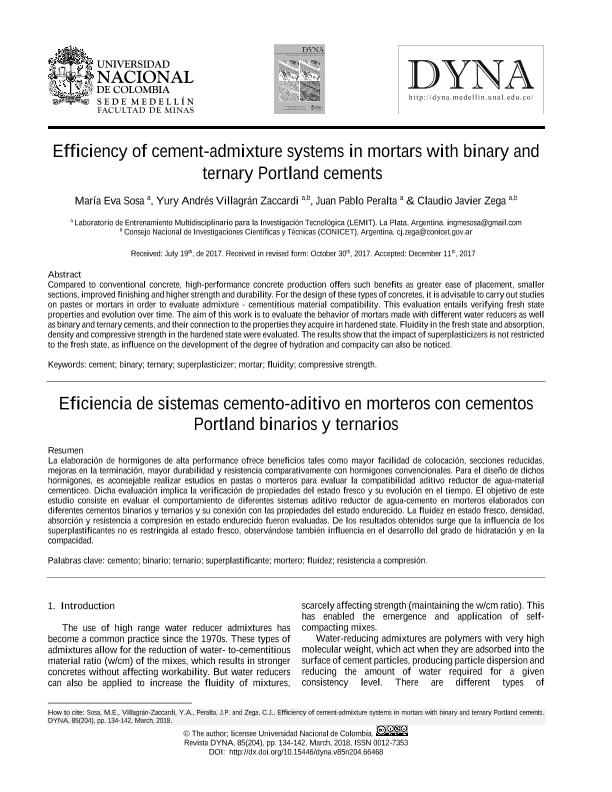Mostrar el registro sencillo del ítem
dc.contributor.author
Sosa, Maria Eva

dc.contributor.author
Villagrán Zaccardi, Yury Andrés

dc.contributor.author
Peralta, Juan Pablo

dc.contributor.author
Zega, Claudio Javier

dc.date.available
2020-03-19T14:27:18Z
dc.date.issued
2018-01
dc.identifier.citation
Sosa, Maria Eva; Villagrán Zaccardi, Yury Andrés; Peralta, Juan Pablo; Zega, Claudio Javier; Efficiency of cement admixture systems in mortars with binary and ternary Portland cements; Universidad Nacional de Colombia; Dyna; 85; 204; 1-2018; 134-142
dc.identifier.issn
0012-7353
dc.identifier.uri
http://hdl.handle.net/11336/100180
dc.description.abstract
Compared to conventional concrete, high-performance concrete production offers such benefits as greater ease of placement, smaller sections, improved finishing and higher strength and durability. For the design of these types of concretes, it is advisable to carry out studies on pastes or mortars in order to evaluate admixture - cementitious material compatibility. This evaluation entails verifying fresh state properties and evolution over time. The aim of this work is to evaluate the behavior of mortars made with different water reducers as well as binary and ternary cements, and their connection to the properties they acquire in hardened state. Fluidity in the fresh state and absorption, density and compressive strength in the hardened state were evaluated. The results show that the impact of superplasticizers is not restricted to the fresh state, as influence on the development of the degree of hydration and compacity can also be noticed.
dc.description.abstract
La elaboración de hormigones de alta performance ofrece beneficios tales como mayor facilidad de colocación, secciones reducidas, mejoras en la terminación, mayor durabilidad y resistencia comparativamente con hormigones convencionales. Para el diseño de dichos hormigones, es aconsejable realizar estudios en pastas o morteros para evaluar la compatibilidad aditivo reductor de agua-material cementiceo. Dicha evaluación implica la verificación de propiedades del estado fresco y su evolución en el tiempo. El objetivo de este estudio consiste en evaluar el comportamiento de diferentes sistemas aditivo reductor de agua-cemento en morteros elaborados con diferentes cementos binarios y ternarios y su conexión con las propiedades del estado endurecido. La fluidez en estado fresco, densidad, absorción y resistencia a compresión en estado endurecido fueron evaluadas. De los resultados obtenidos surge que la influencia de los superplastificantes no es restringida al estado fresco, observándose también influencia en el desarrollo del grado de hidratación y en la compacidad.
dc.format
application/pdf
dc.language.iso
eng
dc.publisher
Universidad Nacional de Colombia

dc.rights
info:eu-repo/semantics/openAccess
dc.rights.uri
https://creativecommons.org/licenses/by-nc-nd/2.5/ar/
dc.subject
CEMENT
dc.subject
BINARY
dc.subject
TERNARY
dc.subject
SUPERPLASTICIZER
dc.subject
MORTAR
dc.subject
FLUIDITY
dc.subject
COMPRESSIVE STRENGTH
dc.subject.classification
Ingeniería Civil

dc.subject.classification
Ingeniería Civil

dc.subject.classification
INGENIERÍAS Y TECNOLOGÍAS

dc.title
Efficiency of cement admixture systems in mortars with binary and ternary Portland cements
dc.title
Eficiencia de sistemas cemento aditivo en morteros con cementos Portland binarios y ternarios
dc.type
info:eu-repo/semantics/article
dc.type
info:ar-repo/semantics/artículo
dc.type
info:eu-repo/semantics/publishedVersion
dc.date.updated
2020-03-16T14:01:20Z
dc.journal.volume
85
dc.journal.number
204
dc.journal.pagination
134-142
dc.journal.pais
Colombia

dc.journal.ciudad
Medellín
dc.description.fil
Fil: Sosa, Maria Eva. Consejo Nacional de Investigaciones Científicas y Técnicas. Centro Científico Tecnológico Conicet - La Plata; Argentina. Provincia de Buenos Aires. Gobernación. Comisión de Investigaciones Científicas. Laboratorio de Entrenamiento Multidisciplinario para la Investigación Tecnológica; Argentina
dc.description.fil
Fil: Villagrán Zaccardi, Yury Andrés. Consejo Nacional de Investigaciones Científicas y Técnicas. Centro Científico Tecnológico Conicet - La Plata; Argentina. Provincia de Buenos Aires. Gobernación. Comisión de Investigaciones Científicas. Laboratorio de Entrenamiento Multidisciplinario para la Investigación Tecnológica; Argentina
dc.description.fil
Fil: Peralta, Juan Pablo. Provincia de Buenos Aires. Gobernación. Comisión de Investigaciones Científicas. Laboratorio de Entrenamiento Multidisciplinario para la Investigación Tecnológica; Argentina. Consejo Nacional de Investigaciones Científicas y Técnicas. Centro Científico Tecnológico Conicet - La Plata; Argentina
dc.description.fil
Fil: Zega, Claudio Javier. Provincia de Buenos Aires. Gobernación. Comisión de Investigaciones Científicas. Laboratorio de Entrenamiento Multidisciplinario para la Investigación Tecnológica; Argentina. Consejo Nacional de Investigaciones Científicas y Técnicas. Centro Científico Tecnológico Conicet - La Plata; Argentina
dc.journal.title
Dyna

dc.relation.alternativeid
info:eu-repo/semantics/altIdentifier/doi/http://dx.doi.org/10.15446/dyna.v85n204.66468
dc.relation.alternativeid
info:eu-repo/semantics/altIdentifier/url/https://revistas.unal.edu.co/index.php/dyna/article/view/66468
dc.relation.alternativeid
info:eu-repo/semantics/altIdentifier/url/http://www.scielo.org.co/scielo.php?script=sci_arttext&pid=S0012-73532018000100134&lng=es&nrm=iso&tlng=en
Archivos asociados
